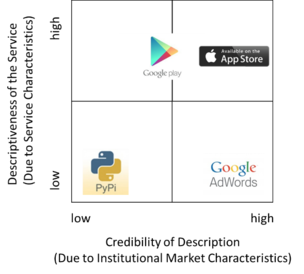Subproject A4 (since July 1, 2015)
Empirical Analysis in Markets for OTF Services
In this subproject, we empirically and experimentally analyze how customer review systems can contribute to reducing information asymmetries in electronic markets for composed services. As still-to-be-developed OTF markets are a specific type of electronic markets, reducing information asymmetries in these OTF markets is essential to prevent the market from failing (in the sense of a "market for lemons"). When examining the role of customer reviews in these markets, we consider the influence of specific OTF market characteristics, particularly the possible consequences of changes to the review system’s design. The methods we apply in this subproject involve empirical studies using self-collected data from already existing electronic markets, which have one or more characteristics that are similar to the OTF market to be developed in the project. We will also conduct laboratory experiments in the Paderborn Business and Economic Research Laboratory (BaER-Lab) to examine the issues to be answered in the subproject. We also use linguistic and machine learning approaches to investigate mainly unstructured information from customer reviews.
Purpose of Subproject A4 (since 2019):
- Reduce information asymmetries in OTF markets, which are caused by large numbers of service providers included in the composition process and the properties of the service compositions, mainly with experience and credence attributes.
- Analyze the interaction of customer reviews and the consumer behavior prior to and during the purchase decisions.
- Identify factors that affect the generation, provision and attributes of customer reviews.
- Design and evaluate different manifestations of customer review systems that reduce information asymmetries in OTF markets.
Specifically, the subproject is organized into the following three areas.
Customer reviews in the pre-purchase phase in markets with OTF characteristics
We investigate the influence of expert opinions and experienced customers, who share their experience by means of customer reviews, on the purchase decision of less experienced customers. So far, aggregated measures are mainly used to investigate the impact of customer reviews. As in general, complex and specifically composed services are traded in OTF markets, more sophisticated approaches might be more appropriate for analysis. Hence, we apply linguistic analysis to reveal a deeper understanding of the interaction between the provided information in customer reviews and the consumer behavior prior to and during the purchase decision.
Drivers of customer reviews in markets with OTF characteristics
In this area, we identify factors that have an impact on the generation, provision or attributes (e.g., the valence or helpfulness of reviews) of customer reviews in the context of OTF markets. As the services are individually configured, the purpose of employment by the reviewer is highly relevant in this context. For example, an OTF provider who configures machine learning algorithms for customers might be assessed differently by customers with different purposes of employment, such as the classification of pictures vs. the classification of texts.
Design of OTF customer review systems
We focus on the design of customer review systems. So far, for specific design elements the literature shows their impact on drivers of customer reviews and on economic outcomes. For example, the number of review dimensions affects the valence of reviews as well as pricing decisions. However, the effect and the possibilities of other specific design elements (such as the implementation of review templates) is, so far, not investigated on markets that are similar to the OTF market.
- Analyze causal effects of customer reviews and certifications on service quality.
- Investigate opportunities and limits of customer reviews and certifications that help to reduce information asymmetries in OTF markets.
- Design and evaluate different manifestations of customer review systems and certifications that reduce information asymmetries in OTF markets
Specifically, the subproject is organized into the following three areas.
In this area, we focus on the influence of fraudulent customer reviews on the efficiency of instruments that are designed to reduce information asymmetries in electronic markets.
The OTF market is a decentralized marketplace with many service providers and OTF providers who are responsible for the composition process and customer contact. This market structure causes challenges on different levels. For example, a challenge is to disaggregate these composed service reviews to assessments of single services supplied by service providers.
Further information:

